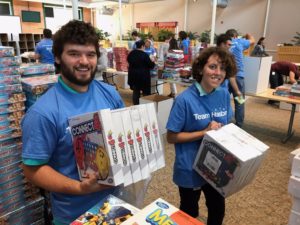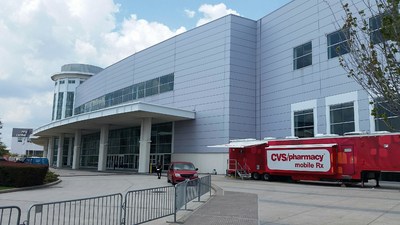LISC Grants, Initiatives and People Recognized
LISC Rhode Island awarded Amos House $476,000 to implement its Bridges to Career Opportunities (BCO) model, a comprehensive education and support program designed to provide tailored services to move people into employment. The new grant is part of $72 million in funding awarded to 32 organizations through the U.S. Labor Department’s Reentry Project, which is focused on evidence-based opportunities to reduce recidivism.
With this funding, Amos House will be able to expand its job training and education programs and integrate them with the Financial Opportunity Center offerings, a highly successful program developed by LISC that helps participants with job placement, financial coaching, and access to public benefits. Amos House will adapt the BCO model to address the specific needs and services necessary for individuals recently released from prison.
“As a result of this funding, Amos House will provide intensive wraparound supports related to barriers specific to the re-entry population,” said Jeanne Cola, Executive Director of LISC Rhode Island. “Participants will be able to complete the education and skills training components of the Bridges to Career Opportunities program and transition to employment.”
With a grant from the Social Innovation Fund (SIF), LISC launched its Financial Opportunity Center (FOC) model nationally in 2010 and featured several sites in Rhode Island, including Amos House. FOCs provide clients with three integrated services: employment coaching, financial education and coaching, and assistance accessing income supports. This bundling of services helps clients make important behavioral changes about money and improve their financial outlook, while preparing them to succeed in the workplace. The model has been successful in helping clients see real improvements in net income, net worth, and credit scores. Additional SIF funding allowed LISC to then introduce the Bridges to Career Opportunities model, which incorporated contextualized educational services along with career training programs and provided opportunities for those FOC clients who needed to build additional foundational skills to successfully complete higher-level skills training and be more competitive in the job market.
“In addition to job training and education, providing services to help participants navigate legal and technical matters related to child support, fines, court, parole/probation, as well as help with transportation, housing barriers, and substance abuse, will translate into meaningful change for this vulnerable population,” said Cola.
Approximately 2.3% of adults in Rhode Island are on probation or parole, which as of 6/30/17 was 23,081 adults in the state, and there were 2,797 individuals released in 2017 [1]. Of this number, about 5% of sentenced releases self-reported that they were homeless or had no permanent address. The Department of Corrections also reports that of the total prison population, 52% of men and 61% of women were unemployed at the time they were incarcerated. Additionally, of this 2017 population, 35% of incarcerated men and 25% of incarcerated women had less than a high school education, and 51% of men and 38% of women were re-sentenced within 36 months of release [2].
“We are very grateful to LISC,” said Eileen Hayes, President and CEO of Amos House. “This was a very competitive process and the funding will allow us to focus much more intensively on people entering our training programs and accessing FOC services within 6 months of being released from incarceration.”
Nationwide, there are more than 2.3 million people in prisons, jails and other detention facilities, with 650,000 released each year from prisons alone. Studies on recidivism done by the National Institute of Justice based in Washington D.C. indicate that nearly 77 percent are arrested again within five years.
The award is part of a larger grant from the U.S. Department of Labor which awarded $4.5 million in new funding for LISC Financial Opportunity Centers (FOCs) nationwide. The grant will extend the reach of LISC FOCs in Chicago, Detroit, Indianapolis, Minneapolis and Providence that operate in communities with high rates of poverty, crime and reentry. Amos House is one of only seven organizations across the LISC footprint to receive these funds.
The FOCs are part of a broader LISC effort to expand economic opportunity for low income people. It dovetails with LISC’s community safety work that builds police community partnerships, supports data-driven strategies to take on crime hotspots, and integrates safety into broader programs on economic development, housing and jobs.
People in the News
LISC Rhode Island’s Executive Director Jeanne Cola, who was recently profiled in the Providence Business News, published a ProJo op-ed on the value of supporting childcare as a taxpayer investment.
Deputy Director Cindy Larson received the 2017 Sue Connor Special Friend of Rhode Island’s Children Award from the Rhode Island Association for the Education of Young Children (RIAEYC) during the organization’s 51st opening banquet of their Annual Rhode Island Early Childhood Conference. Larson received the award for her lifetime of work as an early childhood advocate.
In presenting the award, Lisa Hildebrand, Executive Director of the RIAEYC, acknowledged Larson’s advocacy and leadership in early learning and child care in Rhode Island, her role as the founding director of LISC’s Rhode Island Child Care & Early Learning Facilities Fund (RICCELFF), and her long history of work in education.
“We are presenting this award in recognition of her leadership, commitment, and truly tireless efforts working on behalf of the early child care and education community, as well as the children and families of Rhode Island,” said Hildebrand.
“Cindy led the team that conducted a comprehensive study of child care and early learning facility infrastructure in Rhode Island. She was instrumental in receiving special permission to use Race to The Top dollars toward facility improvement and making funding available to help address critical health and safety issues across Rhode Island’s early childhood centers,” said Hildebrand.
In accepting the award, Larson noted that there is still work to be done despite broad acceptance on the critical importance of the issues around early childhood.
“Thank you all so much, this honor means a great deal to me,” said Larson. “It should be really easy to be an early childhood advocate – all the research suggests that the early years of life are the most critical; we have widespread agreement with the importance of early education; we know that quality child care is essential to building a workforce and having a strong economy.
“Everybody agrees on all these things, and yet every single day we have programs that are struggling just to make ends meet. So the money is not connecting to what we know, despite our best efforts. We welcome all the new champions and I hope your voices will be loud and strong. We will continue to advocate strongly with you for the resources that you need to make a difference in the lives of children.”


